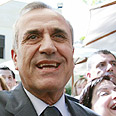
Lebanon elects army chief Suleiman as president
As part of deal with Hizbullah, Lebanese government elects Gen. Michel Suleiman as next president, ending six-month waiting period for vote as well as 18 months of political instability
The Hizbullah-led opposition and Western-backed government agreed last week to elect Suleiman as part of their deal to end the 18-month political crisis. The presidential vote had been postponed 19 times since November when the last president, Emile Lahoud, left office.
Suleiman's inauguration speech attempted to cater to the opinions of both the US-backed Lebanese government and its opposition, Hizbullah.
During his speech, Suleiman turned to Hizbullah leaders and said, "The establishment of an opposition party derives from necessity, following the country's breakup… Its success in removing the occupiers (Israel) derives from the heroism of its people and the power of its fallen.
"The remaining of the Sheeba Farms (Mount Dov area) under occupation, the continuing threat of the enemy and its infiltration into our domain obligates us to adopt a defensive strategy that will secure our homeland. We must produce advantages from the opposition's energy as a service for this strategy."
In his speech Suleiman also committed himself to the "release of the prisoners and detainees", and to his country's friendship with Syria.
Suleiman, a compromise candidate, ran unopposed. He won 118 votes of the 127 living members of the legislature, according to parliament speaker Nabih Berri. There were six blank ballots. Two legislators voted for one-time presidential hopefuls and one was in the name "Rafik Hariri and the martyred legislators" - a reference to the slain former prime minister and five other lawmakers killed in bombings in the last three years.
The political crisis in Lebanon exploded into violence last month, and dozens were killed in the outbreak. The riots were started in Beirut but quickly spread to vast areas of the country and ended only when the Lebanese government surrendered to Hizbullah's demands.
Last week Arab mediators announced that the Lebanese government would be reconstructed according to the deal made with Hizbullah in order to end the crisis. According to the deal, 11 of the 30 ministers in a national unity government in Beirut will be Hizbullah members, giving the Shiite organization the right to veto any decision.
Celebratory gunfire and occasional explosions reverberated across Beirut as news of Suleiman's election was announced. In the general's hometown of Aamchit on the Mediterranean coast north of the capital, hundreds of people broke out in cheers and dancing in the main square as they watched the vote on a giant screen.
AP also contributed to this article










